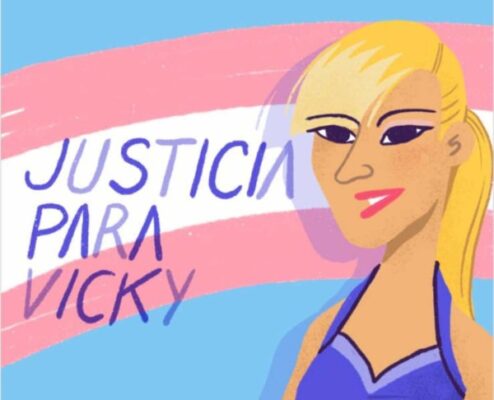Extracts from Human Rights Watch: “Honduras: Court Finds State Responsible for Trans Killing”
Vicky Hernández was a trans rights defender, sex worker, and a member of Unidad Color Rosa, a collective dedicated to the defence of the rights of trans people in Honduras.
On the night of 28 June 2009, Vicky was on the street with a couple of workmates. There was a curfew in place because of the military coup that took place in Honduras that year. That night a police patrol tried to arrest Vicky and her friends, but they ran away. The next morning Vicky’s body was found. Her death was not properly investigated by the authorities and nobody was arrested for her murder.

Three years after her murder Cattrachas Lesbian Network, a Honduran LGBTIQ+ rights organisation, filed a petition with the Inter-American Commission on Human Rights, alleging state responsibility in Hernández’s killing. The Commission found the state of Honduras to be responsible but submitted the case to the Inter-American Court of Human Rights in April 2019 when Honduras failed to comply with the commission’s recommendations.
On 26 June 2021, 12 years after Hernández murder, a landmark ruling by the Inter-American Court of Human Rights held that Honduras had violated Hernández’ rights to life and personal integrity. The finding of a violation of the right to life rested on the fact that police harassed Hernández the night before she was killed and, due to the coup, the military and police had effective control of the streets on the night she died. The court also noted the increase in violence against transgender people at the time of the coup, as well as the generalised violence that LGBTIQ+ people face in Honduras and the prevailing impunity for such violence. The Court also found that Honduras violated the right to life because the authorities did not comply with their obligation to effectively investigate Hernández’s death.
The ruling highlighted the fact that Hernández did not have the opportunity to display her gender identity and chosen name on her ID card, and that this had a significant impact on the investigation into her case. Additionally, the Court indicated that this lack of formal acknowledgement of her self-perceived identity may have promoted discrimination and social exclusion for expressing her chosen identity.
The court ordered Honduras to train security forces on how to conduct investigations of anti-LGBT violence within two years and to improve data collection on cases motivated by anti-LGBT bias. The court said Honduras’ investigation of the Hernández case was inadequate and discriminatory in part because it did not take into account Hernández’s self-perceived gender identity. As such, it ordered the government to adopt a procedure for the legal recognition of gender, allowing people to change the gender listed on their documents to match their identity, within two years. The court also ordered financial reparations for Hernández’s family, as well the creation of a scholarship programme for trans women.
The court held that Honduras violated a series of other rights, such as the rights to private life, judicial protection, and freedom of expression. Notably, it found a violation of the Inter-American Convention on the Prevention, Punishment, and Eradication of Violence against Women (better known as the Belém do Pará Convention). It reasoned that violence against transgender women on the basis of gender identity or expression “is also based on gender, as a social construction of identities, functions and attributes socially assigned to women and men,” and is therefore applicable.
Experts consider this sentence of the Inter-American Court of Human Rights memorable, because it forces the State of Honduras to promote the recognition of the LGTBI population, specially trans people. Rosa, the mother of Vicky Hernández has declared that the ruling “Is historic because justice was served for all”.
#JusticiaParaVicky | Honouring trans activist Vicky Hernández, By Robert F. Kennedy Human Rights
